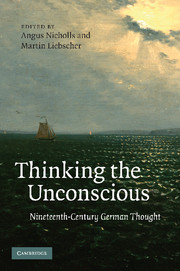Crossref Citations
This Book has been
cited by the following publications. This list is generated based on data provided by Crossref.
McGrath, Sean
2014.
The question concerning metaphysics: a Schellingian intervention in analytical psychology.
International Journal of Jungian Studies,
Vol. 6,
Issue. 1,
p.
23.
Burdett, Carolyn
2014.
A Concise Companion to Psychoanalysis, Literature, and Culture.
p.
49.
Järvilehto, Lauri
2015.
The Nature and Function of Intuitive Thought and Decision Making.
p.
1.
Phelps, Scott
2016.
Brain Ways: Meynert, Bachelard and the Material Imagination of the Inner Life.
Medical History,
Vol. 60,
Issue. 3,
p.
388.
Henry, Phillip
and
Fong, Benjamin Y.
2018.
A Whole Climate of Critique: Psychoanalytic Politics between Vitality and Obsolescence.
Critical Historical Studies,
Vol. 5,
Issue. 1,
p.
119.
Otabe, Tanehisa
2019.
The Unconscious.
Journal of Aesthetics and Phenomenology,
Vol. 6,
Issue. 2,
p.
95.
Andersson, Johan Daniel
2021.
Telluric Recollection: On the Disappearance of History in Deep Time.
Anthropocenes – Human, Inhuman, Posthuman,
Vol. 2,
Issue. 1,
Richards, Sinan
2023.
Dialectics of Love in Sartre and Lacan.
p.
61.



